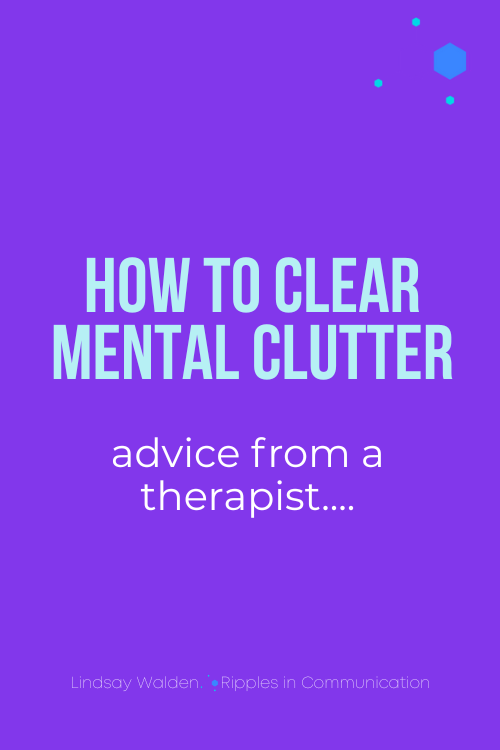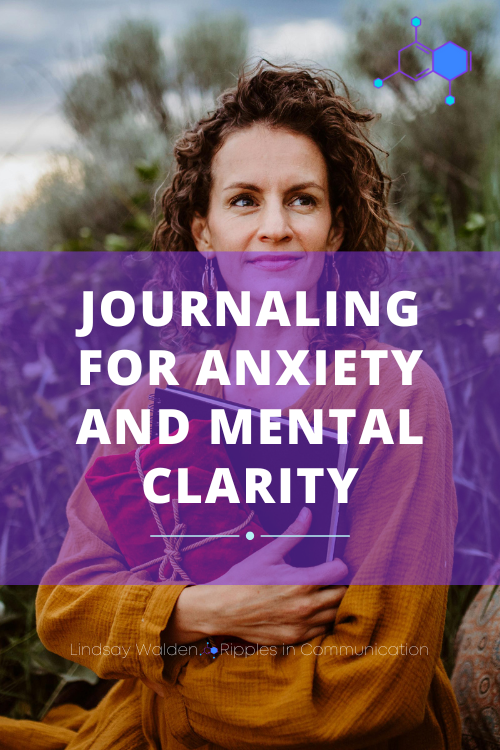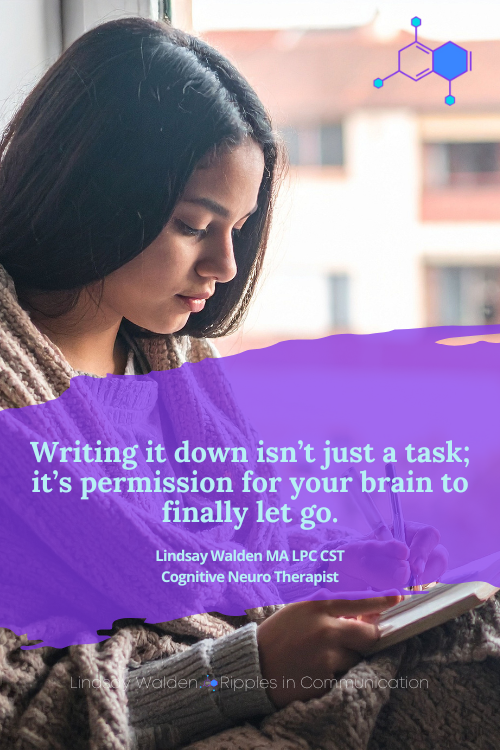How to Declutter Your Mind (and Finally Breathe Again)
Have you ever felt like your brain is a web browser with a hundred tabs open?
Half-finished thoughts. Worries you can’t let go of. Random reminders popping up at the worst times. Memories you’d rather forget.
Maybe you find yourself asking: Did I reply to that email? What should I make for dinner? Why am I still thinking about that awkward moment from years ago?
If that’s you, you’re far from alone.
Clients tell me all the time:
“I just can’t shut my mind off.” “I feel scattered, distracted, overwhelmed.” “I can’t focus on anything because I’m thinking about everything.”
This is what I call mental clutter.
It’s one of the biggest, most overlooked sources of stress, anxiety, and even relationship strain. Because when your mind feels cluttered, everything feels harder.
But here’s the good news: you don’t have to live this way. Your brain isn’t broken. There’s a proven, practical way to clear the clutter and reclaim your calm.
In this post, we’ll talk about why your brain can’t (and shouldn’t) hold everything at once, how writing things down helps you let go, three journaling techniques you can start using right away, and how to make this practice sustainable so you can finally breathe again.
Have you grabbed your FREE CNT Toolkit Sampler yet? It’s packed with science-backed tools designed to help you regulate emotions, manage stress, and develop deep self-awareness. If you’ve ever felt overwhelmed by your reactions or stuck in negative thought patterns, this toolkit will give you the proven strategies I use with clients to help them strengthen emotional neutrality, rewire unhelpful responses, and build lasting resilience. Inside, you’ll find practical exercises and guided reflections to help you navigate challenges with clarity and confidence. Enter your email below, and I’ll send it straight to your inbox!
Why Mental Clutter Happens (It’s Not Your Fault)
Your brain wasn’t designed to hold everything at once.
It has a very limited working memory—typically only four to seven pieces of information at a time. Yet most of us try to stuff it with our entire to-do list, random worries about the future, old memories, replayed conversations, and big plans.
It’s like trying to juggle a hundred balls when you were only meant to hold a few. Naturally, some will drop.
This overload leads to mental fog that makes it hard to focus, decision fatigue that turns even small choices into stressful battles, and elevated stress that refuses to let your mind shut off—especially at night.
If you’ve ever laid awake replaying the day’s worries, you know exactly how this feels.
But this isn’t about personal weakness or lack of discipline. It’s a basic design limitation of the human brain. And the good news is that once you understand it, you can work with it instead of against it.
The Neuroscience of Offloading Your Thoughts
Your brain is built to process information, not store it indefinitely.
When you insist on keeping every task, worry, idea, and plan in your head, you’re clogging the very part of your brain that’s supposed to help you solve problems calmly and effectively.
Writing things down acts like opening the pressure valve. It sends your brain a clear message: you don’t have to hold this anymore. It’s safe to let go. You can focus on what matters now.
There’s real science behind this. Research shows writing down worries reduces activity in the amygdala—the brain’s fear center that triggers stress responses. It also activates the prefrontal cortex, the rational, problem-solving region. By reducing cognitive overload, you restore focus and emotional regulation.
This isn’t vague self-care advice. It’s a brain-based, evidence-supported method to help you feel better and think more clearly.
Why Writing Feels Like Hitting Reset
If you’ve ever written down a long to-do list and felt your shoulders relax, you know this intuitively.
Your brain treats writing like an external hard drive. Once your thoughts are on paper, your mind no longer feels responsible for reminding you about them over and over. Instead of looping and replaying worries, your mind gets a break.
That’s why journaling can feel like hitting a reset button for your brain. It’s not about being a “good writer” or keeping a perfect diary. It’s purely practical—a tool to help you offload mental clutter and create space for calm, focused thinking.
3 Therapist-Approved Journaling Methods to Declutter Your Mind
If you’re feeling overwhelmed, scattered, or just foggy, here are three practical ways to use journaling to clear mental space—starting today.
You don’t have to do all of them. Just pick the one that feels most doable.
The Brain Dump Method When your mind is buzzing with too many thoughts, set a timer for five minutes. Write down everything—no editing, no structure. When the timer goes off, stop. That’s it. Your brain stops fearing it will forget something. You’re telling it that everything is safely stored. This simple act can bring surprising relief and help you focus on what truly matters.
The Mental Categorization Method When your thoughts feel chaotic and tangled, divide a page into four sections: To-Do (things you need to act on), Worries & Anxieties (stressors you’re ruminating on), Ideas & Insights (things you want to remember), and Emotional Thoughts (feelings you need to process). Writing your thoughts into these categories helps you turn mental chaos into order. It clarifies what requires action, what’s just mental noise, and what’s worth saving for later.
The “One Next Step” Method When big tasks or worries feel paralyzing, write down the one thing that’s stressing you out. Then ask: What’s the smallest next step I can take? Write down that single step and then do it. By shifting from impossible tasks to clear, tiny actions, you reduce anxiety, gain momentum, and remind yourself that progress is always possible—even when it feels overwhelming.
How to Make This Practice Sustainable
Here’s what stops most people from using journaling effectively: they think they have to do it perfectly.
You don’t need to write every day. You don’t need to follow strict prompts or fill an entire page.
Journaling is meant to serve you, not stress you out. The most effective journaling practice is the one you’ll actually do.
Treat it like a flexible, anytime tool. Use it when your mind feels too full, before a big conversation, during moments of strong emotion, or when you can’t sleep. When you make it easy and accessible, you’re more likely to return to it whenever you need it.
The 5-Minute Clarity Challenge
If you want to see the benefits for yourself right now, try this simple exercise:
Set a timer for five minutes and write down everything on your mind without editing or overthinking.
When the timer stops, read it over and ask yourself: What really requires action? What can I let go of? What’s one simple next step?
Even one round of this can bring surprising clarity, help you feel lighter, and restore your sense of control.
Why I Created the Anytime Journal
A lot of my clients love the idea of journaling but hate the way traditional planners make them feel guilty for missing a day or not using every prompt.
That’s why I designed the Anytime Journal to work with you, not against you.
It’s flexible and unstructured, so you can write exactly what you need, when you need it—no guilt, no pressure. Whether you need space for a five-minute brain dump, a categorized thought sort, or planning a single next step, it’s always there for you.
Because you don’t have to wait until you’re completely overwhelmed to give your mind the break it deserves.
Final Thoughts: Your Brain Deserves a Break
Most people walk around trying to hold everything in their head without realizing there’s another way. They never slow down to process, letting worries pile up until they feel unmanageable.
But your mind isn’t meant to store everything. It’s meant to process it.
Journaling is one of the simplest, most effective, evidence-based ways to clear mental clutter. It helps you think more clearly, feel calmer, and show up more fully in your life and relationships.
Instead of letting thoughts swirl endlessly, try this: write them down, let them go, and move forward with clarity.
Your brain—and your whole self—will thank you for it.
Ready to start? The Anytime Journal was designed to help you declutter your mind whenever you need it most. Learn more and get yours today—so you can finally breathe again.







